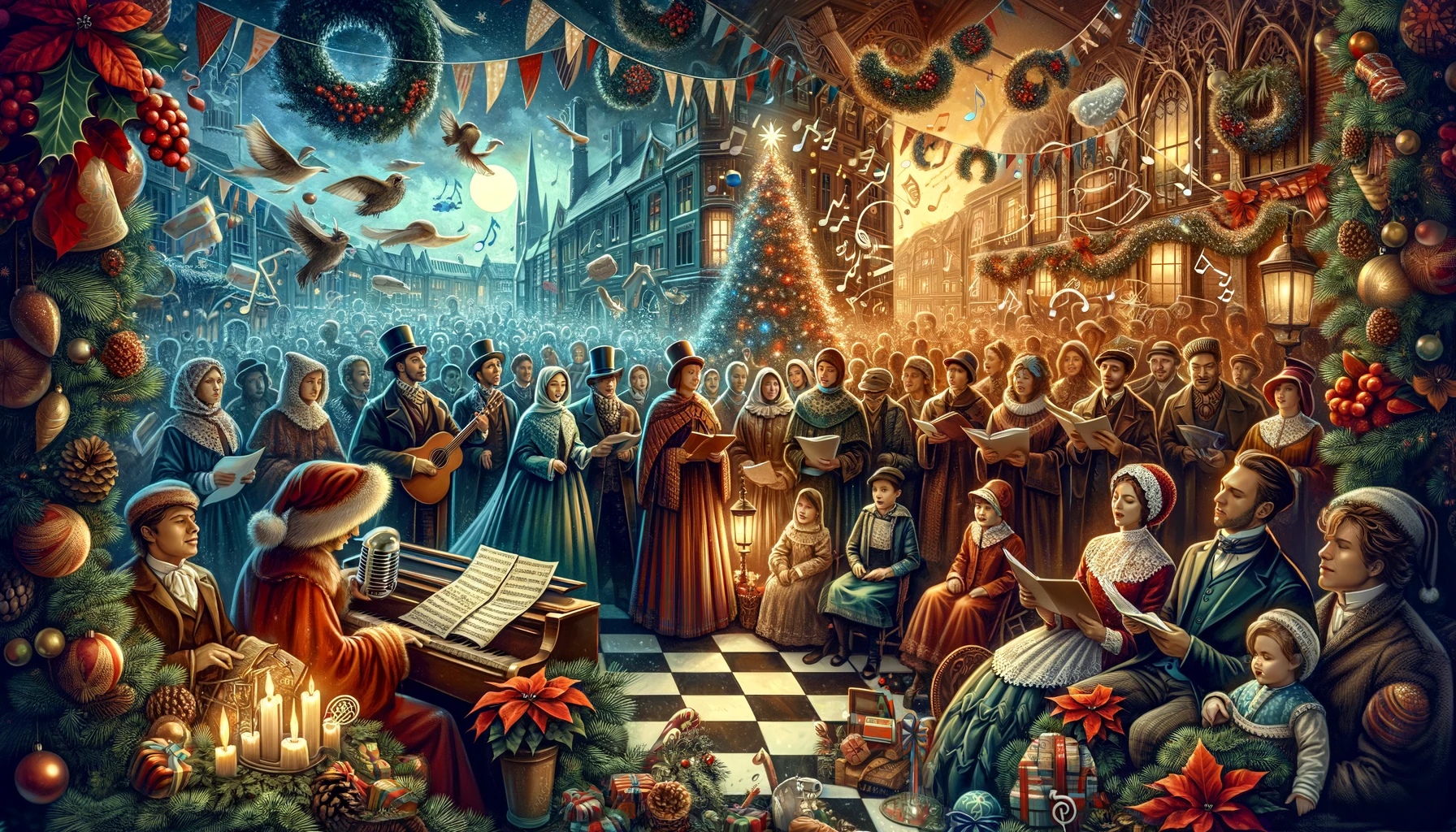The History of Christmas Carols: A Journey Through Time and Tradition
Form a band online, promote your music, buy custom beats, sound parts, and share your Beat or Track as a Royalty Free loop with us. Collaborate to make beats online with the best loop makers from around the world on the Forum for musicians and beat makers. Keep up to date with Music News and learn from FL Studio Video Tutorials and the articles on the Blog. Free DAW Music Software downloads, VST and Instrument Packs for FL Studio, Pro Tools, Logic, Ableton, and how to use the most popular free DAW Software, Fruity Loop Plugins, MIDIs and more.

Christmas carols, integral to the holiday season, are much more than mere festive songs. They represent a rich historical tapestry, intertwining with cultural and religious traditions across the centuries. This article explores their journey from pagan rituals to their status as beloved seasonal anthems.
Origins of Christmas Carols
The earliest Christmas carols emerged from a blend of pagan Winter Solstice celebrations and the advent of Christianity. Initially, these carols were not songs in the modern sense but rather communal dances accompanied by simple choruses. By the Middle Ages, these had evolved into songs with religious themes. The first English carols appeared in a 1426 work by John Audelay, reflecting a tradition that included house-to-house singing by wassailers
During medieval times, the Christian church began incorporating these carols into religious observances. The Renaissance era further transformed carols, introducing sophisticated musical compositions and a variety of instruments. Notably, Martin Luther, a seminal figure in Protestantism, was a proponent of congregational singing and the popularization of carols outside of church services
During medieval times, the Christian church began incorporating these carols into religious observances. The Renaissance era further transformed carols, introducing sophisticated musical compositions and a variety of instruments. Notably, Martin Luther, a seminal figure in Protestantism, was a proponent of congregational singing and the popularization of carols outside of church services
With the advent of radio and television in the 20th century, Christmas carols gained global popularity, transcending their religious and cultural origins. The modern era saw these carols become a staple of both popular and commercial music, with artists across genres offering their renditions. This period also saw the diversification of carols, with new songs being added to the traditional repertoire
Christmas carols are a global phenomenon, with different cultures adapting them to local traditions and languages. For instance, "Silent Night" is one of the most widely translated and sung carols in the world, showcasing the universal appeal of these songs. This section will explore various cultural interpretations of carols and how they reflect different holiday traditions worldwide.
Christmas carols have played a significant role in social and cultural contexts, far beyond their musical appeal. They have been instrumental in community building, charity events, and social awareness campaigns. This section will delve into how carols have been used to foster community spirit, promote unity, and bring about social change.
Cultural Variations of Christmas Carols
The universality of Christmas carols is perhaps most vividly illustrated by their variations across cultures. While the core themes of Christmas remain constant, the style, language, and presentation of carols vary widely. For instance, "Silent Night" has transcended its Austrian origins to become a global Christmas anthem, sung in over 300 languages. This section will explore the rich tapestry of carols around the world, highlighting how different cultures have embraced and adapted these songs to fit their unique holiday traditions.
Beyond their musical charm, Christmas carols have played a significant role in social and cultural contexts. In the Victorian era, caroling became a way to foster community spirit, with groups of singers known as 'Waits' performing in public spaces and being rewarded with treats like mince pies. This tradition of caroling has evolved into a significant community-building activity, often used in charity events and social awareness campaigns. The communal singing of carols brings people together, fostering a sense of unity and shared joy during the holiday season
The relationship between Christmas carols and the Christian church has evolved significantly over the centuries. Initially, the church was cautious in embracing these songs due to their folk origins. However, by the 18th century, carols like 'While Shepherds Watched Their Flocks By Night' became acceptable in Anglican churches, with the lyrics being drawn directly from the Bible. This acceptance marked a turning point, leading to the integration of carols into church services and celebrations. This section will explore how carols gradually became a staple of church Christmas celebrations, shaping the religious observance of the holiday
The revival and adaptation of Christmas carols in the modern era have been remarkable. The Victorian era was crucial in this revival, with collections of carols being published and new carols being composed. The 20th century saw further evolution, with carols being adapted to various musical styles and settings. This section will delve into the revival of carols in the Victorian era and their adaptation in modern times, highlighting how these songs have remained relevant and beloved over the years.
Christmas carols have had a significant presence in literature and popular culture. Charles Dickens' "A Christmas Carol" famously features carol singing, reflecting the Victorian era's embrace of these songs. The 20th century saw carols becoming a staple of holiday films, television shows, and radio broadcasts. This section will explore the representation of Christmas carols in literature and popular culture, examining how they have been used to evoke the spirit of the holiday season.
The enduring appeal of Christmas carols lies in their ability to resonate across generations and cultures. From their origins in pagan and Christian traditions to their modern adaptations, carols have been a constant presence in Christmas celebrations. As we look to the future, it's clear that Christmas carols will continue to evolve, adapting to new musical styles and cultural contexts while retaining their essence. They remain not just songs, but symbols of unity, joy, and the spirit of the holiday season.
